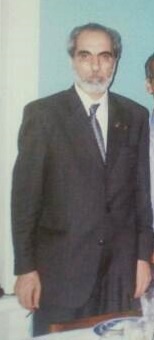
Back أبو الفضل إلجي بيك Arabic Abulfaz Elchibey AST Əbülfəz Elçibəy AZ ابوالفضل ائلچیبی AZB Абульфаз Эльчыбей BE Абульфаз Эльчыбэй BE-X-OLD Эльчибей Абульфаз Къадиркъули охӀли CE Abulfaz Elčibej Czech Əbülfəz Elçibəy German Abulfaz Elĉibej EO
Abulfaz Elchibey | |
|---|---|
Əbülfəz Elçibəy | |
 | |
| 2nd President of Azerbaijan | |
| In office 17 June 1992 – 24 June 1993 | |
| Prime Minister | Rahim Huseynov Ali Masimov (acting) Panah Huseynov |
| Preceded by | Ayaz Mutallibov Isa Gambar (acting) |
| Succeeded by | Heydar Aliyev |
| Personal details | |
| Born | Abulfaz Gadirgulu oghlu Aliyev 24 June 1938 Kalaki, Ordubad District, Nakhichivan ASSR, Azerbaijan SSR, USSR |
| Died | 22 August 2000 (aged 62) Ankara, Turkey |
| Political party | Azerbaijan Popular Front |
| Spouse | Halima Aliyeva |
| Children | 2 |
| Signature | |
Abulfaz Gadirgulu oghlu Aliyev (Azerbaijani: Əbülfəz Qədirqulu oğlu Əliyev; 24 June 1938 – 22 August 2000), better known as Abulfaz Elchibey (Azerbaijani: Əbülfəz Elçibəy),[1] was an Azerbaijani politician, Azerbaijani nationalist and Soviet dissident who was the first and only democratically elected President in post-Soviet Azerbaijan. He was the leader of the Azerbaijani Popular Front and played an important role in achieving Azerbaijan's independence from the Soviet Union.
Elchibey was elected as the president of Azerbaijan in independent Azerbaijan's first free election. He served from 17 June 1992 until his overthrow in a 24 June 1993 military coup backed by Russia that led to the installation of Heydar Aliyev as president.[2][3] Elchibey's brief rule was the only post-Soviet period in which Azerbaijan has been democratic.[2] During his rule, Elchibey sought to dismantle the old communist system domestically, such as the planned economy and the black market.[2] In his foreign policy, he sought to re-orient Azerbaijan to the West.[2] However, Elchibey's attempted reforms were put to a halt by the 1993 coup.[2]
According to historian Audrey Altstadt, Elchibey faced several major problems during his tenure as president: "the war in Nagorno-Karabagh (with loss of land and creation of refugees), inflation and related economic problems (including slow progress on an oil deal with foreign investors), and the remnants of Russian-Soviet control and influence of the old order. The most immediately pressing problem was unrest around Baku."[2] During his tenure, Elchibey had to contend with an administration staffed by former Communists and military forces that were not under his control.[4]
He positioned himself as a pan-Turkist[5] while holding hostile views towards Iran and Russia.[6][7]
- ^ "Abulfaz Elchibey – president of Azerbaijan". Retrieved 12 July 2017.
- ^ a b c d e f Altstadt, Audrey L. (1997), Parrott, Bruce; Dawisha, Karen (eds.), "Azerbaijan's struggle toward democracy", Conflict, Cleavage, and Change in Central Asia and the Caucasus, Democratization and Authoritarianism in Post-Communist Societies, Cambridge University Press, pp. 110–155, ISBN 978-0-521-59731-9
- ^ Cornell, Svante E. (2015). Azerbaijan Since Independence. Routledge. p. 78. ISBN 978-1-317-47620-7.
The evidence that Surat Husyenov's coup was engineered in Moscow is as incontrovertible as it gets.
- ^ Ottaway, Marina (2003). Democracy Challenged: The Rise of Semi-Authoritarianism. Carnegie Endowment for International Peace. pp. 56–57. doi:10.2307/j.ctt1mtz6c5. ISBN 978-0-87003-195-3. JSTOR j.ctt1mtz6c5.
- ^ Gasimov, Zaur (2022). "Observing Iran from Baku: Iranian Studies in Soviet and Post-Soviet Azerbaijan". Iranian Studies. 55 (1): 52. doi:10.1080/00210862.2020.1865136. S2CID 233889871.
- ^ Waal, Thomas de (2013), "Black Garden: Armenia and Azerbaijan through Peace and War", Black Garden, New York University Press, p. 87, doi:10.18574/nyu/9780814770825.001.0001, ISBN 978-0-8147-7082-5
- ^ Cohen, Ronen A.; Lev, Tzvi (2021). "A Triangle of Interests: Azerbaijan, Iran and Israel". Iran and the Caucasus. 25 (1): 84. doi:10.1163/1573384X-20210108. S2CID 236630765.
Strongly anti-Iran, Elchibey supported a pro-Western foreign policy, called for Iran's Turkophone population to unify with Azerbaijan, and accused the Islamic Republic of fomenting a religious revival among his country's Shi'ites.